新概念英语第一册 Lesson 133-134(直接间接引语)课件(共51张PPT,内嵌视频)
文档属性
| 名称 | 新概念英语第一册 Lesson 133-134(直接间接引语)课件(共51张PPT,内嵌视频) |
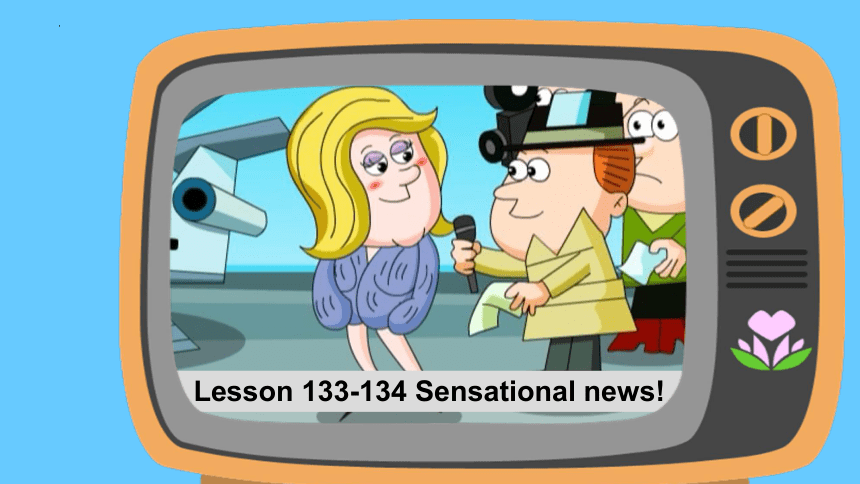
|
|
| 格式 | pptx | ||
| 文件大小 | 29.1MB | ||
| 资源类型 | 教案 | ||
| 版本资源 | 新概念英语 | ||
| 科目 | 英语 | ||
| 更新时间 | 2025-05-21 00:00:00 | ||
图片预览

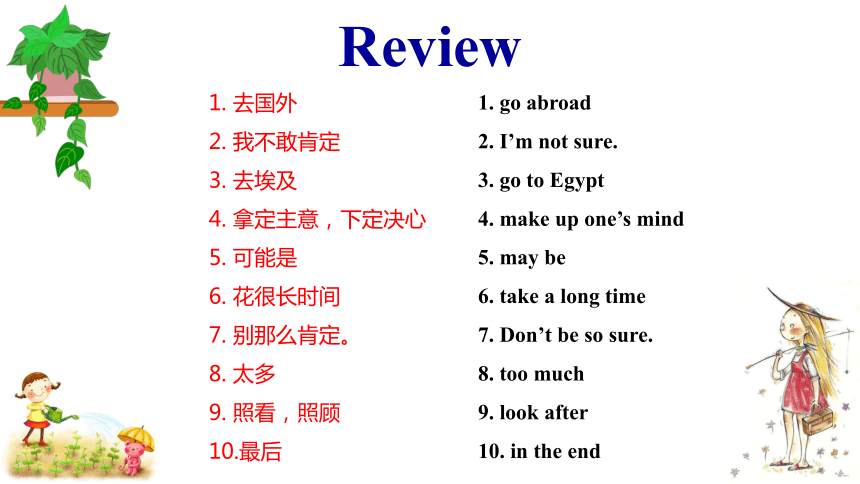

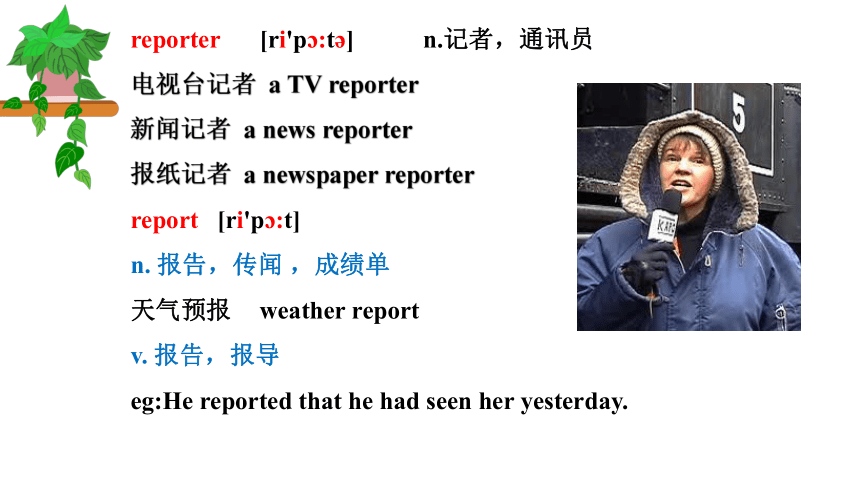
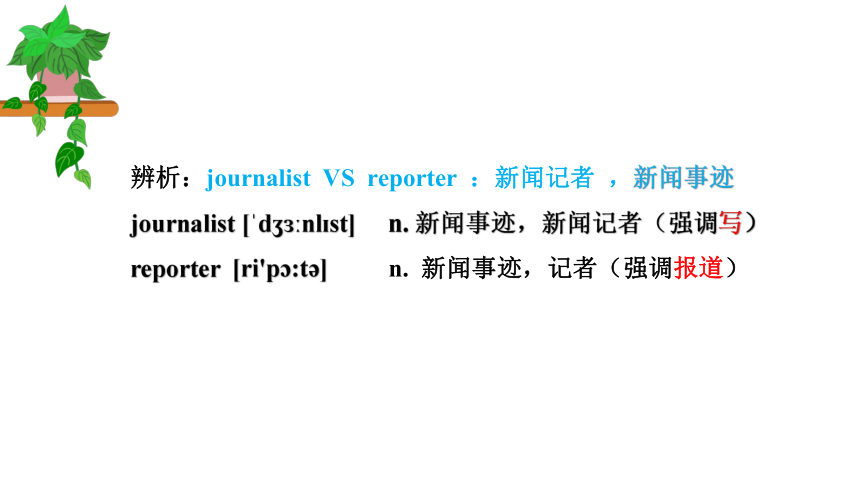
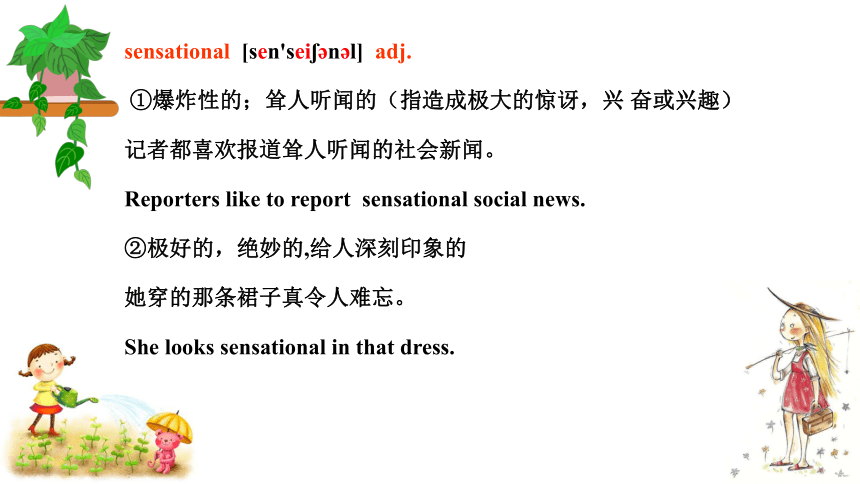
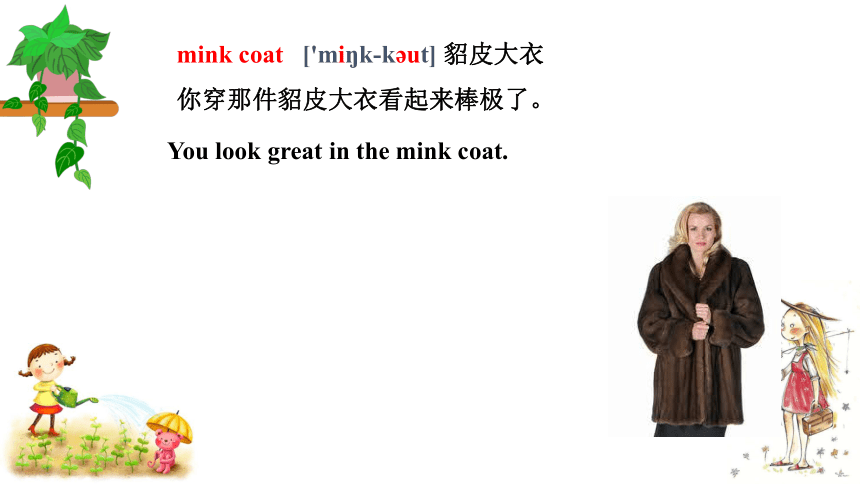
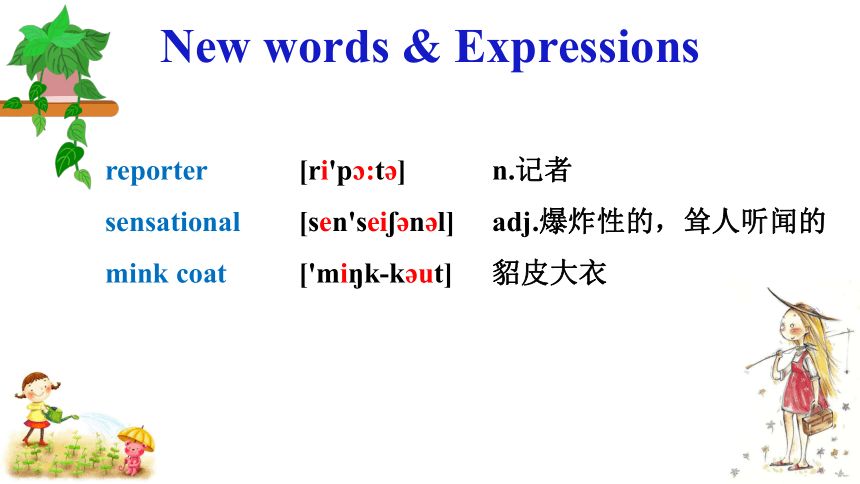
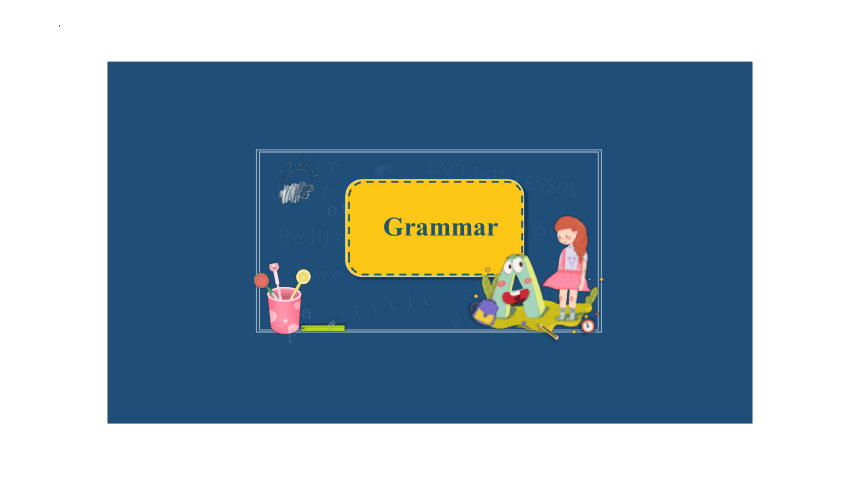
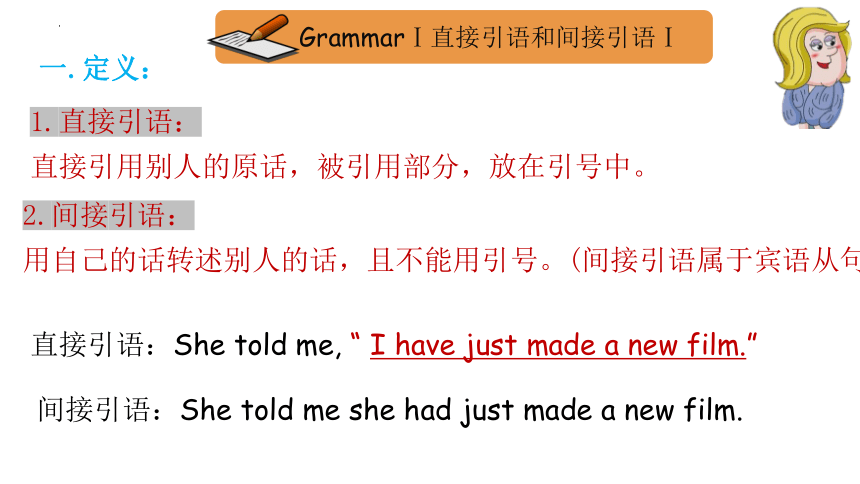

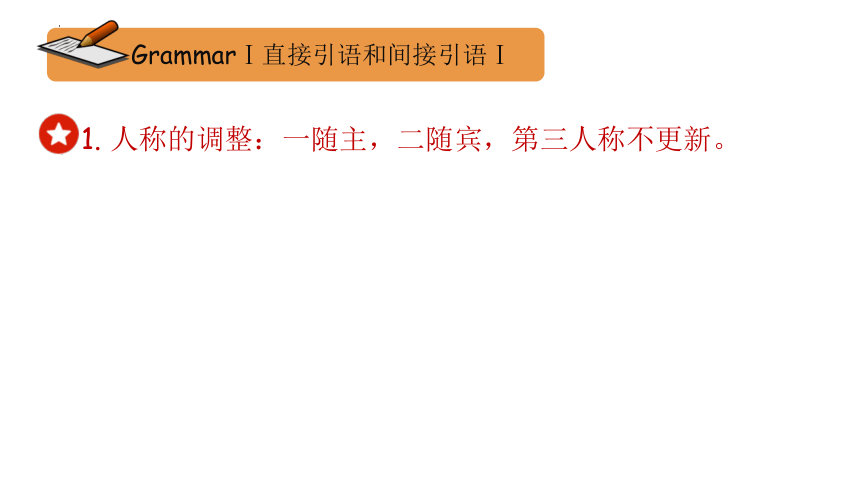
文档简介
(共51张PPT)
Lesson 133-134 Sensational news!
Review
1. go abroad
2. I’m not sure.
3. go to Egypt
4. make up one’s mind
5. may be
6. take a long time
7. Don’t be so sure.
8. too much
9. look after
10. in the end
1. 去国外
2. 我不敢肯定
3. 去埃及
4. 拿定主意,下定决心
5. 可能是
6. 花很长时间
7. 别那么肯定。
8. 太多
9. 照看,照顾
10.最后
ENGLISH LESSON
Hello
sun
title
TV
dog
flag
table
love
apple
orange
one
dog
star
sky
two
New Words
reporter [ri'p :t ] n.记者,通讯员
电视台记者 a TV reporter
新闻记者 a news reporter
报纸记者 a newspaper reporter
report [ri'p :t]
n. 报告,传闻 ,成绩单
天气预报 weather report
v. 报告,报导
eg:He reported that he had seen her yesterday.
辨析:journalist VS reporter :新闻记者 ,新闻事迹
journalist [ d nl st] n. 新闻事迹,新闻记者(强调写)
reporter [ri'p :t ] n. 新闻事迹,记者(强调报道)
sensational [sen'sei n l] adj.
①爆炸性的;耸人听闻的(指造成极大的惊讶,兴 奋或兴趣)
记者都喜欢报道耸人听闻的社会新闻。
Reporters like to report sensational social news.
②极好的,绝妙的,给人深刻印象的
她穿的那条裙子真令人难忘。
She looks sensational in that dress.
mink coat ['mi k-k ut] 貂皮大衣
你穿那件貂皮大衣看起来棒极了。
You look great in the mink coat.
New words & Expressions
reporter [ri'p :t ] n.记者
sensational [sen'sei n l] adj.爆炸性的,耸人听闻的
mink coat ['mi k-k ut] 貂皮大衣
ENGLISH LESSON
Hello
sun
title
TV
dog
flag
table
love
apple
orange
one
dog
star
sky
two
Grammar
1.直接引语:
直接引用别人的原话,被引用部分,放在引号中。
直接引语:She told me, “ I have just made a new film.”
GrammarⅠ直接引语和间接引语Ⅰ
2.间接引语:
用自己的话转述别人的话,且不能用引号。(间接引语属于宾语从句)
间接引语:She told me she had just made a new film.
一.定义:
二.直接引语如何
转变成间接引语
人称发生改变(人称)
时态发生改变(时态)
语序要用陈述语序(句型)
1. 人称的调整:一随主,二随宾,第三人称不更新。
GrammarⅠ直接引语和间接引语Ⅰ
“一随主”是指在直接引语变间接引语时,如果从句中的主语是第一人称或被第一人称所修饰。从句中的人称要按照主句中主语的人称变化如:
She said, "My brother wants to go shopping with me. ”
→She said her brother wanted to go shopping with her.
“二随宾”是指直接引语变间接引语时,若从句中的主语及宾语是第二人称或被第二人你所修饰。从句中的人称要跟引号外的主句的宾语一致。如:
He said to Kate, "How is your sister ''
→He asked Kate how her sister was .
“第三人称不更新”是指直接引语变间接引语时。如果从句中的主语及宾语是第三人称或被第三人称所修饰从句中的人称一般不需要变化如:
Mr. Smith said, “Jack is a good boy.”
→Mr. Smith said Jack was a good boy.
2.时态变化:主现从不限,主过从也过;
客观真理, 非现不可。
1)如果主句是现在时, 间接引语的时态还是用它原本的时态
She says, “ I want to eat some cake.”
→She says she wants to eat some cake.
GrammarⅠ直接引语和间接引语Ⅰ
2)如果主句是过去时, 间接引语的时态也要用相应的过去时态
①一般现在时改为一般过去时:
She said, “I want to eat some cake.”
→She said she wanted to eat some cake.
GrammarⅠ直接引语和间接引语Ⅰ
②现在进行时,改为过去进行时
She said, “ I am reading a book.”
→She said she was reading a book.
③现在完成时,改为过去完成时
She said, “I have had breakfast.”
→She said she had had breakfast.
GrammarⅠ直接引语和间接引语Ⅰ
④一般将来时→过去将来时
she said,“Mr. Jones will see you now” .
→She said that Mr. Jones would see you now..
⑤can---could/ may---might/have to-had to
“You can go now,” the teacher said.
→The teacher said that you could go now.
GrammarⅠ直接引语和间接引语Ⅰ
当主句为一般过去时,从句时态变化规律:
1) 一般现在时→一般过去时
2) 现在进行时→过去进行时
3)现在完成时→过去完成时
4)一般过去时→过去完成时
5)一般将来时→过去将来时
6)can---could may –might have to-had to
主句时态
从 句 时 态
连 接 前
连 接 后
一般现在时
时态保持不变
一般过去时
一般现在时
一般过去时
一般过去时
过去完成时
一般将来时
过去将来时
现在进行时
过去进行时
现在完成时
过去完成时
2. 时态变化表格
注意:如果从句部分是客观真理,时态不用发生改变
She said, “ The earth goes around the sun.”
→She said the earth goes around the sun.
GrammarⅠ直接引语和间接引语Ⅰ
272页Ⅰ书面练习·B
模仿例句回答以下问题
I’m tired. –What did he say
He said he was tired.
272页Ⅰ书面练习·B
1. I’m busy. –What did he say
He said he was busy.
2. She’s cold. –What did he say
He said she was cold.
272页Ⅰ书面练习·B
3. The book’s interesting. –What did she say
She said the book was interesting.
4. They’re hungry. –What did he say
He said they were hungry.
272页Ⅰ书面练习·C
模仿例句回答以下问题
I’m reading. – What did he tell you
He told me he was reading.
272页Ⅰ书面练习·C
1. I’m working. –What did he tell you
He told me he was working.
2. She’s leaving. –What did they tell you
They told me she was leaving.
272页Ⅰ书面练习·C
3. They’re joking. –What did she tell you
She told me they were joking.
4. Tom’s waiting. –What did he tell you
He told me Tom was waiting.
272页Ⅰ书面练习·D
模仿例句回答以下问题
I’ve finished. – What did he tell you
He told me he had finished.
272页Ⅰ书面练习·D
1. I’ve met him. –What did he tell you
He told me he had met him.
2. I’ve lost it. –What did he tell you
He told me he had lost it.
272页Ⅰ书面练习·D
3. It has stopped. –What did she tell you
She told me it had stopped.
4. She has arrived.–What did they tell you
They told me she had arrived.
ENGLISH LESSON
Hello
sun
title
TV
dog
flag
table
love
apple
orange
one
dog
star
sky
two
Text
What is the most sensational news that you have heard
Lead in
127
What reasons did Karen Marsh give for going to retire
What reasons did Karen Marsh give for going to retire
She felt tired.
课文讲解
Have you just made a new film,Miss Marsh Yes, I have.
make a film 拍摄一部电影
现在完成时:主语+have/has+动词过去分词+sth.
Are you going to make another No, I'm not.
another =another film
I’m going to retire.
I feel very tired.
feel 感官动词 feel+形容词
I don't want to make another film for a long time.
want to do sth. 想要做某事
want sb. to do sth. 想让某人做某事
for a long time 很长一段时间
Let’s buy a newspaper, Liz. Listen to this!
Let’s do sth. 让我们做…
listen to 听,表听的动作
hear 表示结果
'Karen Marsh: Sensational News!
By our reporter, Alan[ l n] Jones.
by表示动作的执行者,意为“由….”或“被…”
Karen Marsh arrived at London Airport today.
arrive at +小地点
arrive in +大地点
She was wearing a blue dress and a mink coat.
wear “穿着“ (强调状态)
put on “穿上“,表“穿上”的动作
dress “给…穿衣”
She told me she had just made a new film.
She said she was not going to make another.
She said she was going to retire.
She told reporters she felt very tired and didn't want to make another film .
I wonder why!
wonder “想知道”,表示疑惑
Thanks for watching
Lesson 133-134 Sensational news!
Review
1. go abroad
2. I’m not sure.
3. go to Egypt
4. make up one’s mind
5. may be
6. take a long time
7. Don’t be so sure.
8. too much
9. look after
10. in the end
1. 去国外
2. 我不敢肯定
3. 去埃及
4. 拿定主意,下定决心
5. 可能是
6. 花很长时间
7. 别那么肯定。
8. 太多
9. 照看,照顾
10.最后
ENGLISH LESSON
Hello
sun
title
TV
dog
flag
table
love
apple
orange
one
dog
star
sky
two
New Words
reporter [ri'p :t ] n.记者,通讯员
电视台记者 a TV reporter
新闻记者 a news reporter
报纸记者 a newspaper reporter
report [ri'p :t]
n. 报告,传闻 ,成绩单
天气预报 weather report
v. 报告,报导
eg:He reported that he had seen her yesterday.
辨析:journalist VS reporter :新闻记者 ,新闻事迹
journalist [ d nl st] n. 新闻事迹,新闻记者(强调写)
reporter [ri'p :t ] n. 新闻事迹,记者(强调报道)
sensational [sen'sei n l] adj.
①爆炸性的;耸人听闻的(指造成极大的惊讶,兴 奋或兴趣)
记者都喜欢报道耸人听闻的社会新闻。
Reporters like to report sensational social news.
②极好的,绝妙的,给人深刻印象的
她穿的那条裙子真令人难忘。
She looks sensational in that dress.
mink coat ['mi k-k ut] 貂皮大衣
你穿那件貂皮大衣看起来棒极了。
You look great in the mink coat.
New words & Expressions
reporter [ri'p :t ] n.记者
sensational [sen'sei n l] adj.爆炸性的,耸人听闻的
mink coat ['mi k-k ut] 貂皮大衣
ENGLISH LESSON
Hello
sun
title
TV
dog
flag
table
love
apple
orange
one
dog
star
sky
two
Grammar
1.直接引语:
直接引用别人的原话,被引用部分,放在引号中。
直接引语:She told me, “ I have just made a new film.”
GrammarⅠ直接引语和间接引语Ⅰ
2.间接引语:
用自己的话转述别人的话,且不能用引号。(间接引语属于宾语从句)
间接引语:She told me she had just made a new film.
一.定义:
二.直接引语如何
转变成间接引语
人称发生改变(人称)
时态发生改变(时态)
语序要用陈述语序(句型)
1. 人称的调整:一随主,二随宾,第三人称不更新。
GrammarⅠ直接引语和间接引语Ⅰ
“一随主”是指在直接引语变间接引语时,如果从句中的主语是第一人称或被第一人称所修饰。从句中的人称要按照主句中主语的人称变化如:
She said, "My brother wants to go shopping with me. ”
→She said her brother wanted to go shopping with her.
“二随宾”是指直接引语变间接引语时,若从句中的主语及宾语是第二人称或被第二人你所修饰。从句中的人称要跟引号外的主句的宾语一致。如:
He said to Kate, "How is your sister ''
→He asked Kate how her sister was .
“第三人称不更新”是指直接引语变间接引语时。如果从句中的主语及宾语是第三人称或被第三人称所修饰从句中的人称一般不需要变化如:
Mr. Smith said, “Jack is a good boy.”
→Mr. Smith said Jack was a good boy.
2.时态变化:主现从不限,主过从也过;
客观真理, 非现不可。
1)如果主句是现在时, 间接引语的时态还是用它原本的时态
She says, “ I want to eat some cake.”
→She says she wants to eat some cake.
GrammarⅠ直接引语和间接引语Ⅰ
2)如果主句是过去时, 间接引语的时态也要用相应的过去时态
①一般现在时改为一般过去时:
She said, “I want to eat some cake.”
→She said she wanted to eat some cake.
GrammarⅠ直接引语和间接引语Ⅰ
②现在进行时,改为过去进行时
She said, “ I am reading a book.”
→She said she was reading a book.
③现在完成时,改为过去完成时
She said, “I have had breakfast.”
→She said she had had breakfast.
GrammarⅠ直接引语和间接引语Ⅰ
④一般将来时→过去将来时
she said,“Mr. Jones will see you now” .
→She said that Mr. Jones would see you now..
⑤can---could/ may---might/have to-had to
“You can go now,” the teacher said.
→The teacher said that you could go now.
GrammarⅠ直接引语和间接引语Ⅰ
当主句为一般过去时,从句时态变化规律:
1) 一般现在时→一般过去时
2) 现在进行时→过去进行时
3)现在完成时→过去完成时
4)一般过去时→过去完成时
5)一般将来时→过去将来时
6)can---could may –might have to-had to
主句时态
从 句 时 态
连 接 前
连 接 后
一般现在时
时态保持不变
一般过去时
一般现在时
一般过去时
一般过去时
过去完成时
一般将来时
过去将来时
现在进行时
过去进行时
现在完成时
过去完成时
2. 时态变化表格
注意:如果从句部分是客观真理,时态不用发生改变
She said, “ The earth goes around the sun.”
→She said the earth goes around the sun.
GrammarⅠ直接引语和间接引语Ⅰ
272页Ⅰ书面练习·B
模仿例句回答以下问题
I’m tired. –What did he say
He said he was tired.
272页Ⅰ书面练习·B
1. I’m busy. –What did he say
He said he was busy.
2. She’s cold. –What did he say
He said she was cold.
272页Ⅰ书面练习·B
3. The book’s interesting. –What did she say
She said the book was interesting.
4. They’re hungry. –What did he say
He said they were hungry.
272页Ⅰ书面练习·C
模仿例句回答以下问题
I’m reading. – What did he tell you
He told me he was reading.
272页Ⅰ书面练习·C
1. I’m working. –What did he tell you
He told me he was working.
2. She’s leaving. –What did they tell you
They told me she was leaving.
272页Ⅰ书面练习·C
3. They’re joking. –What did she tell you
She told me they were joking.
4. Tom’s waiting. –What did he tell you
He told me Tom was waiting.
272页Ⅰ书面练习·D
模仿例句回答以下问题
I’ve finished. – What did he tell you
He told me he had finished.
272页Ⅰ书面练习·D
1. I’ve met him. –What did he tell you
He told me he had met him.
2. I’ve lost it. –What did he tell you
He told me he had lost it.
272页Ⅰ书面练习·D
3. It has stopped. –What did she tell you
She told me it had stopped.
4. She has arrived.–What did they tell you
They told me she had arrived.
ENGLISH LESSON
Hello
sun
title
TV
dog
flag
table
love
apple
orange
one
dog
star
sky
two
Text
What is the most sensational news that you have heard
Lead in
127
What reasons did Karen Marsh give for going to retire
What reasons did Karen Marsh give for going to retire
She felt tired.
课文讲解
Have you just made a new film,Miss Marsh Yes, I have.
make a film 拍摄一部电影
现在完成时:主语+have/has+动词过去分词+sth.
Are you going to make another No, I'm not.
another =another film
I’m going to retire.
I feel very tired.
feel 感官动词 feel+形容词
I don't want to make another film for a long time.
want to do sth. 想要做某事
want sb. to do sth. 想让某人做某事
for a long time 很长一段时间
Let’s buy a newspaper, Liz. Listen to this!
Let’s do sth. 让我们做…
listen to 听,表听的动作
hear 表示结果
'Karen Marsh: Sensational News!
By our reporter, Alan[ l n] Jones.
by表示动作的执行者,意为“由….”或“被…”
Karen Marsh arrived at London Airport today.
arrive at +小地点
arrive in +大地点
She was wearing a blue dress and a mink coat.
wear “穿着“ (强调状态)
put on “穿上“,表“穿上”的动作
dress “给…穿衣”
She told me she had just made a new film.
She said she was not going to make another.
She said she was going to retire.
She told reporters she felt very tired and didn't want to make another film .
I wonder why!
wonder “想知道”,表示疑惑
Thanks for watching
同课章节目录
